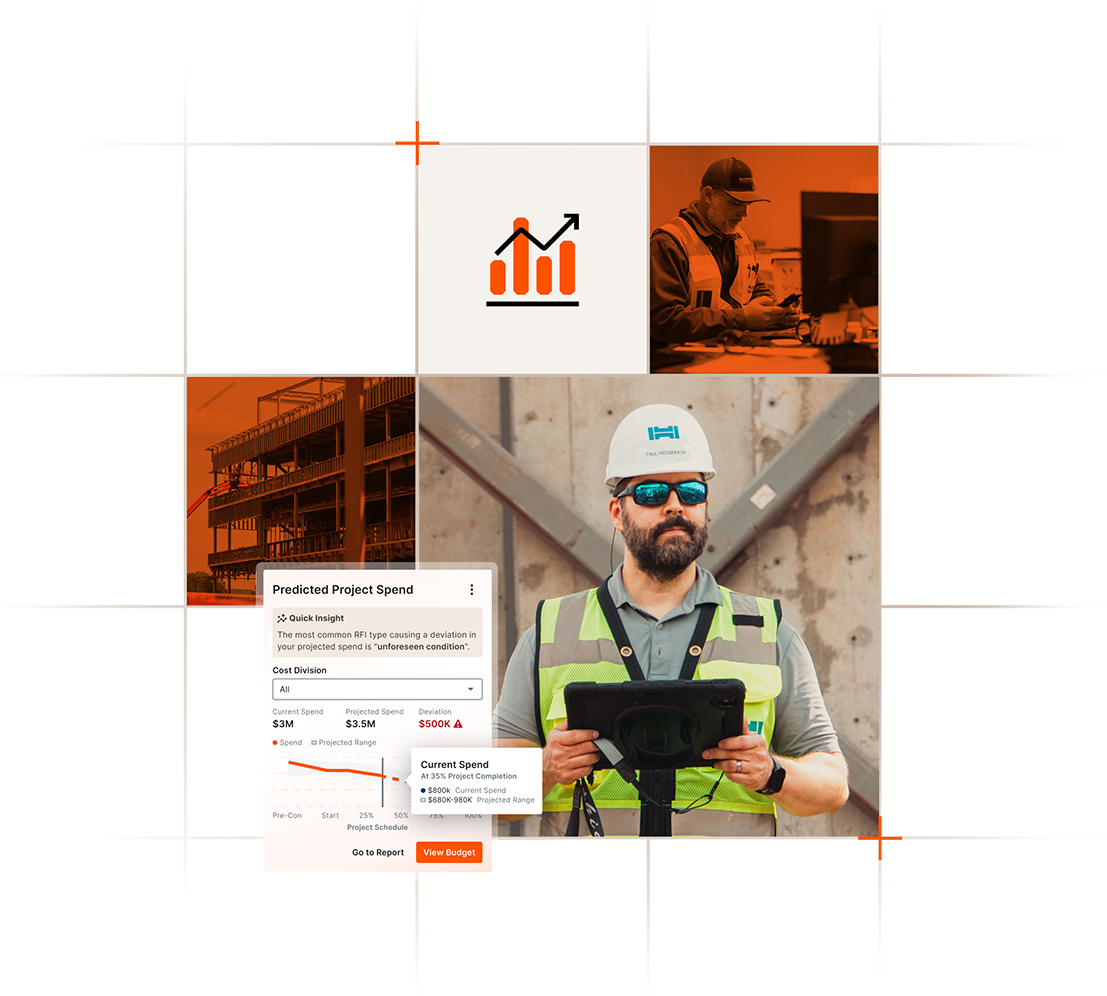— 12 min read
A Project Manager’s Role in Construction


Last Updated Oct 3, 2025

Scott Bornman
Principal, Operational Excellence
16 articles
Scott Bornman is a managing strategic product consultant at Procore Technologies. Scott began his long construction career after a successful 8+ years in the U.S. Army, where he selected to be U.S. Army Recruiter following Desert Shield/Desert Storm. Scott has had many roles in the construction field since then, working his way from a project superintendent, to an owner's rep, to a senior project manager and even Vice President of Construction at Bognet Construction and Director of Construction at Plaza Construction before joining the team at Procore.

Kristen Frisa
Contributing Writer
113 articles
Kristen Frisa is a contributing writer for Procore. She also contributes to a variety of industry publications as a freelance writer focused on finance and construction technology. Kristen holds a Bachelor of Arts in Philosophy and History from Western University, with a post-graduate certificate in journalism from Sheridan College. She lives in Ontario, Canada.
Last Updated Oct 3, 2025

The project manager (PM) on a construction project is vital in delivering a successful project. The PM is responsible for providing the project the clients expect to receive safely and within a reasonable time and budget.
A construction project manager is not at the top of the leadership ladder in their company — there are other roles above them in a construction firm's executive structure. However, the PM is typically in charge of successful delivery for a specific construction project. It can be stressful and time-consuming, but a rewarding job.
This article will discuss the role of the project manager throughout a typical construction build, what it takes to be successful in the role and the career path to become a project manager and beyond.
Table of contents
Construction Project Manager Responsibilities
A construction project manager is responsible for overseeing and coordinating all aspects of a construction project, ensuring it is completed on time, within budget and to the required quality standards.
PMs manage resources, schedules and budgets while communicating clearly with clients, contractors and regulatory bodies so everyone stays on track and knows what to expect. Their role is especially important for risk management and compliance with safety and quality regulations.
A good project manager takes ownership of a project, accepting accountability for everything about its success or failure. Below are some of the tasks the project manager takes on over the course of a project.
Project Planning and Scheduling
Develop detailed project plans and timelines, making sure all milestones and deadlines are met.
Budget Management
Oversee and control project costs.
Resource Allocation
Manage the procurement and allocation of materials, labor and equipment.
Team Leadership
Lead and manage project teams, including architects, engineers, contractors and subcontractors.
Risk Management
Identify potential risks and develop strategies to mitigate them.
Communication
Facilitate communication among all stakeholders, ensuring alignment and information flow.
Quality Control
Make sure all work meets required quality standards and complies with regulations.
Site Supervision
Regularly visit construction sites to monitor progress and address any issues.
Contract Management
Negotiate contracts with clients, suppliers and subcontractors.
Safety Compliance
Make sure all safety protocols and regulations are strictly followed on-site.
Let's take a deeper look at some of the project manager's most common tasks.
Bidding
A contractor may not name a project manager until bids are submitted, but in many cases, the PM will be involved in project planning very early on.
General contractors may bring in project managers right at the outset of each bidding process, where they become integral to winning a contract on a design-build or a design-bid-build project. Projects benefit from having early and consistent input from the PM, which provides continuity and a greater understanding of all facets of the project.
Schedule Creation
By the time a project owner awards a contract to a builder, the work has an assigned start date, some specific milestone dates and a substantial completion date. From those constraints, the project manager builds out the project schedule and then becomes responsible for completing the work by those milestone dates.
Staying on budget requires a lot of insight and proactive problem-solving. The PM will work with the superintendent to build look-aheads to ensure that every aspect of the work is set up for success – that the equipment, materials and labor will all be ready when they're needed and that all the tasks and subtasks get completed on time to stick to that schedule.
Supervising the Jobsite
PMs stay updated with project sites through their superintendents’ daily reports and by visiting sites regularly. While on-site, the project manager can get a first-hand view of how the building is coming along, find out if there is anything else the site staff or subcontractors need and courier paperwork or supplies between sites and the office and warehouse.
A seasoned project manager may be working on two to five jobs at a time, and regular site visits are necessary to maintain a connection with each. Site staff and specialty contractors may feel more accountability after seeing and interacting with the project manager.
Facilitating the Work
The PM plays a supporting role in ensuring everything is in line for employees and subcontractors to do their work. Superintendents report to project managers daily regarding what's happening on the site so they can facilitate all upcoming tasks.
PMs also facilitate work by procuring supplies for the jobsite, including office supplies, signage and security equipment. On some projects, PMs are in charge of all materials procurement for the entire site. In those cases, the project manager must oversee ordering, delivery, inspection and storage of materials as needed.
Who PMs Report To — and How They Lead
Together, the PM and the superintendent lead a weekly meeting with specialty contractors to establish work progress and understand the challenges of ongoing and upcoming work. The superintendent may take the lead during these meetings, with the PM offering support when needed.
The PM uses superintendent reports to compile another report to add to the agenda of a weekly owner, architect and constructor (OAC) meeting to touch base and report on where the project stands.
NOV 6, 2025 at 11:00 AM PST / 2:00 PM EST
Free Webinar: Prove your project management software is profitable
Join Procore and Dodge Data & Analytics for a 2025 Dodge ROI Report deep dive.

Skills Every Construction Project Manager Needs
The success of some projects relies heavily on the performance of the PM. Talented project managers can make a name for themselves and have owners seek them out specifically for their projects.
Leadership Skills
A project manager works not only with a team, but with a team of teams — and serves as a conduit between construction stakeholders, including the owner, subcontracting teams and materials suppliers.
Part of being a good leader is earning the trust of colleagues. That means taking the blame when something goes wrong and passing the praise when something goes right. Working harmoniously with so many people means having the humility to understand that the general contractor depends on the hard work of the subcontractors doing the building in the field. Project managers who run a safe, clean site and respectfully interact with subcontractors will have a better rapport and motivate better work from their teams.
Communication
Project managers need solid and empathetic communication skills. Smooth project operations require proactive reporting to owners and executives within their organization about challenges and changes to the project. PMs relay information between superintendents, subcontractors and office staff, actively listening to concerns and brainstorming solutions.
In short, the best project managers preemptively share everything going on with their jobs with everybody who needs to know, as project success may depend on it.
Eagerness to Learn
Construction is ready for change and growth. Construction professionals who succeed in leadership roles analyze, think critically and are prepared to try something new. Inevitably, those who rely solely on set standard operating procedures without interest in improvement will be surpassed by those with fresh ideas. Project managers should be eager and hungry to learn ways to get better.
Great project managers are built by learning from mistakes and moving on. PMs who remain curious and able to adapt to new methodologies and technologies could be the driving force for change across the construction industry.
How Software Tools Support Construction Project Managers
Being a project manager involves keeping a lot of balls in the air — but they don’t have to do the work alone. Cloud-based construction software tools help PMs keep it all together.
There are platforms specifically designed for construction that help track scheduling, manage, store and share documents and effectively manage the project budget. Helpful capabilities for project managers include:
Improved Communication
Software tools can provide one hub for communication from design and construction though closeout. Project managers can standardize back-and-forth conversations between stakeholders in an easy-to-manage system and make sure everyone is aligned.
Complete Oversight and Document Control
When documents go digital, nothing gets lost. A software platform provides a centralized location for all project information, so everyone has access to the latest data and project managers can easily access and control documents.
Real-time Information Access
Real-time dashboards can replaced antiquated, delayed communication of site activities by providing nearly live access to information — helping to avoid unwanted surprises.
Better Project Visibility
The software allows project managers to quickly identify potential issues and their impact on the project's schedule and budget, helping them stay ahead of their projects.
Together, these software capabilities optimize project management processes for successful project delivery.
How PMs Fit Into the Bigger Picture of Construction Management
Project managers link the strategic objectives of a construction firm to on-the-ground execution of projects. They translate the vision and goals of upper management into actionable plans, coordinating resources, schedules and teams to facilitate successful outcomes.
PMs facilitate healthy communication towork toward goal alignment between all the stakeholders involved and address challenges proactively.
In larger construction firms, a project manager may work within a broader project management office, which supports project management efforts by creating standard procedures and offering resources to PMs.
In the hierarchy of a construction firm, project managers work directly under directorial leads like operations directors. Working to support project managers are support staff like office managers and assistant project managers.
Career Path for Project Managers in Construction
There's no single path to becoming a construction project manager. Some project managers work their way from skilled trades workers to construction project leaders. Others take a course in construction management and emerge as a PM straight from school. Below are some typical career paths PMs can take to get the role.
Degree in Project Management
Many schools offer construction management degrees and certificates to prepare students for a role as a project manager. A new graduate may expect to get a role as an assistant project manager, working on multiple projects over the course of a few years under an experienced project manager.
The next step might be to work as a project engineer on a few projects before being given a project manager role on a very small, tightly controlled project and with oversight from a more experienced colleague.
Changing Sectors
Some project managers arrive from entirely different industries and must learn the ropes of construction on the job. These construction managers may expect to remain assistant project managers for longer before progressing to project engineer and, finally, project manager.
Professionals from outside the construction world should expect to spend a great deal of time learning how construction works. Knowledge gleaned in the field tends to be harder to come by because it's time and schedule-driven, so dedicated time on-site can help cover the basics for an industry novice.
In any scenario, project managers are given smaller, simpler and shorter projects, with significant oversight from superiors. As experience grows, the PM's projects gradually increase in size and complexity.
Moving Up From Trades
Some construction project managers begin in skilled trades positions and work their way into management over time. Here's how that progression could look:
- A person working in pipefitting who shows responsibility and leadership qualities can be put in charge of other pipefitters.
- Eventually, the pipefitter could be offered a position as a foreman and then a superintendent on a single project.
- The employee could then become a general superintendent who oversees multiple projects simultaneously or a project manager.
The construction profession favors hard work and consistency. A worker who comes to work ready to do clean, careful and safe work and has an open mind can learn and rise through the ranks.
Experience Requirements
Project management is a huge field that exists across industries. It's tempting to think that project managers straight out of school and experienced professionals from other industries could pop into the construction world and do the job.
After all, the fundamentals are the same, no matter whether you're managing huge marketing teams or a construction project.
Leadership, scheduling and problem-solving are common among them all. However, the bigger and more complex the project becomes, the more critical it is that the PM has some background industry knowledge.
While it's possible to move straight from schooling or another industry into an assistant project manager role or even into a position as a project engineer, a project manager on a construction site would benefit greatly from some years in the construction industry. No matter how strong the communication skills, a project manager won’t understand the flow of work on a construction project or the needs of the laborers and subcontractors without some time on the job.
On the other hand, extensive construction experience could actually be detrimental to successful project management. A seasoned pro needs to stay flexible and ready to learn rather than relying on set ideas, which leaves little room for growth within the role.
At a Glance: Construction Project Manager Careers
Average Annual Salary: $118,500 (per the Bureau of Labor Statistics, May 2023)
Typical Education Requirements: A bachelor's degree in construction management, construction science, engineering, or a related field is typically required.
Entry-Level Work Experience Needed: While some graduates may enter junior management roles, most positions require several years of on-the-job experience in the construction industry.
Soft Skills: Analytical skills, business acumen, leadership, communication, time management, negotiation, risk management, problem-solving and adaptability.
The Future Outlook for Project Managers in Construction
Talented construction project managers will remain key players within construction companies into the future. Without a knowledgeable, capable leadership team, construction firms will be limited in the number of projects they can take on.
Technology has already changed a project manager's role within the construction landscape. Already, the PM can visit sites virtually, hold meetings via video call and share documents across sites at the touch of a button.
As time goes on, more project managers may be assisted by artificial intelligence tools that can help schedule, strategically match up workers to tasks according to their skill sets and create look-aheads that sense time crunches earlier on. However, technology is here to aid — not replace — project managers as leaders, communicators and critical thinkers.
Was this article helpful?
Thank you for your submission.
100%
0%
You voted that this article was . Was this a mistake? If so, change your vote
Scroll less, learn more about construction.
Subscribe to The Blueprint, Procore’s construction newsletter, to get content from industry experts delivered straight to your inbox.
By clicking this button, you agree to our Privacy Notice and Terms of Service.
Thank you!
You’re signed up to receive The Blueprint newsletter from Procore. You can unsubscribe at any time.
Categories:
Written by

Scott Bornman
Principal, Operational Excellence | Procore Technologies
16 articles
Scott Bornman is a managing strategic product consultant at Procore Technologies. Scott began his long construction career after a successful 8+ years in the U.S. Army, where he selected to be U.S. Army Recruiter following Desert Shield/Desert Storm. Scott has had many roles in the construction field since then, working his way from a project superintendent, to an owner's rep, to a senior project manager and even Vice President of Construction at Bognet Construction and Director of Construction at Plaza Construction before joining the team at Procore.
View profile
Kristen Frisa
Contributing Writer | Procore
113 articles
Kristen Frisa is a contributing writer for Procore. She also contributes to a variety of industry publications as a freelance writer focused on finance and construction technology. Kristen holds a Bachelor of Arts in Philosophy and History from Western University, with a post-graduate certificate in journalism from Sheridan College. She lives in Ontario, Canada.
View profileExplore more helpful resources

6 Tips to Turn Construction Culture Into Daily Practice
Every construction company has a culture. Whether it’s intentional or not. The difference lies in how that culture shows up on the job. In the first article of this series on...

Turning Values into Workflows: How a GC Firm Operationalized Culture
Culture isn’t just about what companies believe — it’s about how those beliefs show up in day-to-day work. When culture is embedded into operations, it becomes something teams can rely...

How a Successful GC Firm Turned Personalities into Culture
The culture at Ryan Gootee General Contractors (RGGC), a successful construction firm based in New Orleans, was never something the company had to invent. It was always there. Woven into...

Rise of the Super-Sub: Mastering Supply Chain & Logistics for Offsite Construction
Modern construction projects come with ever-increasing demands. Owners want to see more complex builds completed on tighter schedules. At the same time, general contractors (GCs) face challenges like the ongoing...
Free Tools
Calculators
Use our calculators to estimate the cost of construction materials for your next project.
Templates
Find a template to help you with your construction project tasks.
Material Price Tracker
Get the latest U.S. retail prices and view historical trends for common building materials.
Glossary
Explore key terms and phrases used in the industry.
